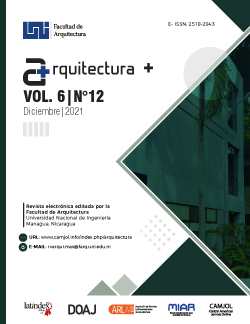Intrangement: incorporated experience of everyday architectural space
DOI:
https://doi.org/10.5377/arquitectura.v6i12.12323Keywords:
bodily experience, everydayzation, everyday space, extended proprioception, phenomenologyAbstract
This article seeks to inquire about the experience of everyday space to analyze the domestic microcosm. The study moves along two fundamental paths: the bodily experience and the architectural space both linked to contemporary criticism around the notion of sensible experience. By extending proprioception in everyday space bodily action is facilitated while reflexivity is hindered; then altering perception becomes a tool to get back to things themselves. To support this hypothesis, a phenomenological explanation of the extended proprioception and the process of quotidianization (Bégout, 2009) are both developed here. Furthermore, perceptual alteration from the singular positioning of attention to the infra ordinary (Perec, 1973) is approached. Methodologically the work is specified as a theoretical reflection. The results show that inquiry in established and naturalized knowledges dominated by the quotidian constitutes a position to overcome certain project automatisms, but also to interpret the behavior patterns directly related to the bodily experience affected by the characteristics of the space. Finally, the notion of estrangement arises as a perceptual alteration. Further research on this topic could be directed towards estrangement as a stimulus for the development of the project process.
Downloads
1220
Downloads
Published
How to Cite
Issue
Section
License
Copyright (c) 2021 Universidad Nacional de Ingeniería

This work is licensed under a Creative Commons Attribution-NonCommercial-NoDerivatives 4.0 International License.



















